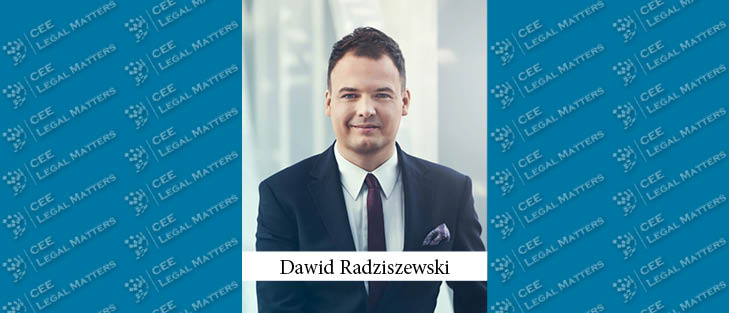From staying loyal to specific lawyers irrespective of the brand they work under to focusing on fixed fees, Selvita General Counsel and Executive Management Board Member Dawid Radziszewski shares his best practices in terms of working with external counsel.
CEELM: What types of legal work does your team tend to externalize?
Radziszewski: For context, Selvita is a contract research organization – we provide assistance in the research projects of pharmaceutical and biotech companies when they are developing their drugs. As a result, we operate in both a highly regulated and innovative space meaning that, most of the time, when we externalize work, it’s usually due to a lack of niche expertise. It’s most often a result of us aiming to expand our offerings and often requires external knowledge to fill in internal knowledge gaps.
We also externalize M&A work, particularly when it involves cross-border matters. Additionally, we tend to outsource complex litigation. We believe it makes more sense to outsource rather than handle it internally, not just because of our team’s bandwidth but also because we prefer to focus on value-generating activities rather than litigation. In our demanding environment, where we support the work of scientists toward value-added offerings, it’s more productive for us to focus on those elements rather than allow ourselves to be distracted by litigations.
Lastly, being a listed company, we also externalize certain regulatory requirements that come with that status.
CEELM: What are the most important criteria you look at when selecting a firm or lawyer for a project?
Radziszewski: The most critical are expertise and experience. We prioritize firms that can demonstrate their capabilities in the specific areas we need, especially since, as mentioned, we’re typically looking for niche expertise. Industry knowledge is also crucial, as is the firm’s reputation. We often ask colleagues for recommendations and consult industry rankings to gauge the level of expertise.
Cost is another consideration, although it is secondary to expertise. The most important factor is having the specific knowledge and experience we require, but we do consider the cost implications.
One last note on this, having read the past Corporate Counsel Handbook, I was surprised to see there’s a split in opinion about whether GCs prefer picking firms or individual lawyers. We’ve followed several lawyers through their career moves, and for us, it’s clear: we value the relationship we’ve built with the individual, regardless of the firm they are with. This loyalty can lead to more engagement and dedication from the lawyer on our projects in return as well.
CEELM: Since it’s at the top of your list, how do you assess expertise?
Radziszewski: We start by creating an information package detailing our project’s objectives and requirements. We then assess the firm’s past track record in similar matters against that package. We use industry rankings and word-of-mouth recommendations to further inform our decision.
CEELM: And, when needed, who do you turn to for word-of-mouth recommendations?
Radziszewski: I typically consult with a network of about 4-5 experienced colleagues, especially when it comes to law firms in other jurisdictions, to get reliable recommendations. I know they are very well-connected and active in various networks and I can reliably rely on great suggestions from them.
CEELM: Do you have a preferred fee structure?
Radziszewski: Our preference is to work on a fixed fee basis. When we clearly communicate our expectations from the outset, we expect the experienced party to provide a precise cost estimate. While projects can take different directions, we prefer to have an estimated cost upfront. In some cases, an hourly rate is necessary, but we try to cap it to manage the budget effectively and understand the costs in advance.
CEELM: What aspects do you not prioritize when receiving a proposal from a firm?
Radziszewski: When we receive proposals, law firms often include a lot of brochures and marketing materials. I rarely flip through these beyond the sections describing the firm’s expertise that is directly relevant to the mandate at hand.
I am interested in the expertise and background of the specific team members who will be assisting Selvita on the project and care less about the firm’s senior team’s remote experience. We always ask for the specific team members who will be advising us, as I want to avoid situations where senior partners present during the pitch but never dial in in subsequent conference calls. Knowing the team upfront is crucial.
We also don’t particularly care about the size of the firm – what matters is its specific expertise. We are perfectly fine working with smaller firms if they have the required experience and knowledge.
CEELM: What best practices have you developed over time in instructing a law firm for a new mandate?
Radziszewski: Typically, we begin with a brief presentation about Selvita to ensure the law firm fully understands our mandate. This is important, especially given the complex environment in which we operate. Setting clear, written objectives helps the law firm prepare its offer initially and aligns expectations in the long run.
Beyond that, communication is key. We maintain regular, open communication, not only for updates and monitoring progress but also to involve our internal lawyers. We take a hands-on approach in all our projects, with at least one internal lawyer constantly involved. We ask our law firms to treat these internal lawyers as part of their team, ensuring more regular communication and helping us build our in-house knowledge base.
CEELM: And since you touched on this, do you internalize input from external counsel in some form of a knowledge bank? If so, how?
Radziszewski: Yes, we do. Through direct collaboration, we assimilate relevant information on a daily basis. We look for best practices identified during, for example, a due diligence that we can implement in our daily operations. Additionally, we use external lawyers for training and development sessions for our team, which has been very beneficial.






















